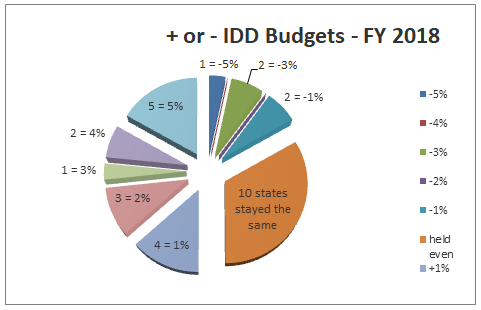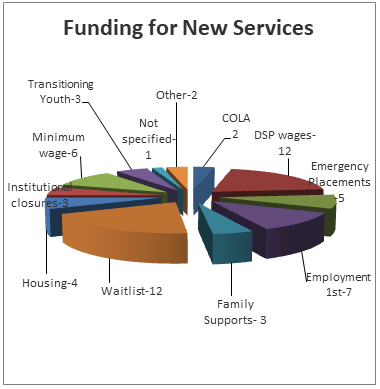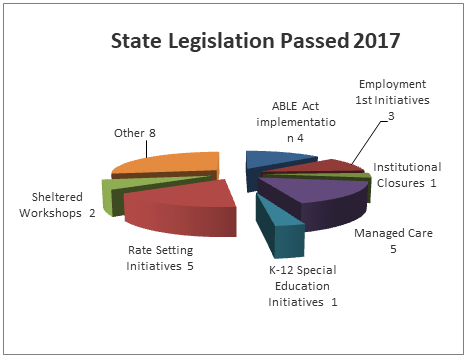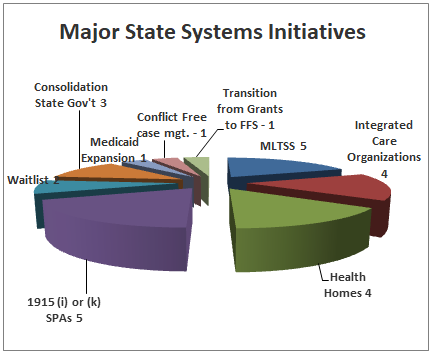 State Association Executives and members of the Board of Representatives recently provided detailed information regarding the status of their individual states in a survey conducted by ANCOR. Forty-six states and the District of Columbia responded. Additionally, ANCOR’s virtual State Share call provided personal accountings of what is happening in 42 of the states. Trends reported include concerns regarding workforce issues – both finding enough people to hire as well as being able to pay competitive wages complicated by rising minimum wage standards with no additional funds to meet them; rate adequacy in general; moving IDD LTSS to managed long term services and supports (MLTSS); transitioning to conflict free case management; and a host of legislative initiatives to meet the national changing Medicaid climate.
State Association Executives and members of the Board of Representatives recently provided detailed information regarding the status of their individual states in a survey conducted by ANCOR. Forty-six states and the District of Columbia responded. Additionally, ANCOR’s virtual State Share call provided personal accountings of what is happening in 42 of the states. Trends reported include concerns regarding workforce issues – both finding enough people to hire as well as being able to pay competitive wages complicated by rising minimum wage standards with no additional funds to meet them; rate adequacy in general; moving IDD LTSS to managed long term services and supports (MLTSS); transitioning to conflict free case management; and a host of legislative initiatives to meet the national changing Medicaid climate.
State Budget Status
States are dealing with two successive years of sluggish revenues for a variety of reasons. Medicaid expenditures comprise a majority of states’ total budgets and revenue fails to keep up with the demand. Thirty-three states had revenue projections below what was expected necessitating mid-year budget cuts in 23 states. For FY 2018 15 states are projecting negative budget growth; 29 states are projecting budget growth between 0 and 5 percent; and six states are projecting budget growth between 5 and 10 percent. (NASBO Spring 2017 Fiscal Survey of States). When ANCOR members were asked whether or not states have a surplus or deficit, 12 reported their state has a surplus (DC, FL, GA, IN, MA, ME, MN, NC, TN, TX, UT, VA) and 10 report a deficit (DE, IA, KS, KY, NJ, OK, OR, PA, RI, WV). Thirteen responded their state had enough to make ends meet (AR, AZ, CA, CO, MD, MI, MS, NE, NH, NM, OH, SC, SD). Last year 20 states reported having a surplus so this is a marked decline in fiscal health. States are still struggling to make ends meet in many cases.
 Twenty four states report funding increases for FY 2018 (AZ ,CA, CO, DC, FL, GA, IN, MA, MD, MI, MN, MO, NC, NJ, NY, PA, RI, SC, SD, TN, UT, VT, WI, WY). Twelve states report funding cuts for FY 2018 (AK, CT, DE, LA, MN, MO, MS, NE, OK, OR, SD, TX); and, 7 states report no change from the current year (AR, IA, KY, MN, NM, OH, WV). In Alaska, grant funds are being converted to waiver services and grants to programs are 50% reduced. Additionally the state is proposing a 416 annual (8 hours a week average) “soft” cap on day habilitation services. In Nebraska, the governor vetoed funding available for provider rates, but the state agency will use administrative funding to hold rates flat. In addition, legislation removed an entitlement for transitioning youth to receive adult services.
Twenty four states report funding increases for FY 2018 (AZ ,CA, CO, DC, FL, GA, IN, MA, MD, MI, MN, MO, NC, NJ, NY, PA, RI, SC, SD, TN, UT, VT, WI, WY). Twelve states report funding cuts for FY 2018 (AK, CT, DE, LA, MN, MO, MS, NE, OK, OR, SD, TX); and, 7 states report no change from the current year (AR, IA, KY, MN, NM, OH, WV). In Alaska, grant funds are being converted to waiver services and grants to programs are 50% reduced. Additionally the state is proposing a 416 annual (8 hours a week average) “soft” cap on day habilitation services. In Nebraska, the governor vetoed funding available for provider rates, but the state agency will use administrative funding to hold rates flat. In addition, legislation removed an entitlement for transitioning youth to receive adult services.
Of the states reporting receiving new funding for disability programs,
 10 will be able to increase wages paid to DSPs (DC, IN, KS, MD, MI, NY, SC, TN, UT, WI);
10 will be able to increase wages paid to DSPs (DC, IN, KS, MD, MI, NY, SC, TN, UT, WI);- 2 received cost of living increases (CO, MD);
- 5 states allocated new money for emergency placements (CA, DE, MD, NC, PA);
- 6 for employment first initiatives (CA, DE, MA, MD, ME, MN, PA);
- 3 for family supports (MD, MA, SD);
- 4 for housing initiatives (MA, MN, NC, NY);
- 3 for institutional closures (CA, MS, PA);
- 6 for increases to minimum wage (AZ, CA, DC, MD, MN, NY);
- 3 for transitioning youth services (MD, PA, SD) down from 7 states last year; and
- 11 states added funding to serve people on waitlists (DE, FL, GA, MD, NC, NH, NJ, NY, PA, VA, WV).
Some states also cut rates. Specifics include cuts to family supports (CT, OK, TX, WV); transitioning youth (CT, NE); ICFs (CA, NE, MS, WV); State IDD administration (CT, MN); case management (ME); and day habilitation (AK).
Eleven states increased sales, gasoline and gambling taxes and fees (CA, DE, IN, ME, NC, NJ, NY, OK, SC, TN, WV) compared with 7 doing so last year. Eleven states cut income, business, and property taxes (AR, FL, IA, MN, MO, NC, NH, NY, OH, RI, WV) compared to 12 last year.
As was the case last year, nearly half of the states (25) report community agencies closing due to lack of funding or inability to hire qualified staff (AZ, CA, CO, CT, FL, GA, IA, KS, KY, LA, ME, MI, MN, MO, NC, NE, NM, OR, RI, TN, TX, VA, WA, WI, WV). This was first reported last year with 20 of the states on this year’s list identifying this for the second year in a row.
Twenty states pursued an increase in the state minimum wage ranging from $8.50 to $15.00+ an hour (AZ, CA, CO, CT, DC, IL, MD, ME, MI, MO, NH, NJ, NM, NY, PA, RI, VA, VT, WA, WY) and ten passed legislation (AZ, CA, CO, DC, IL, ME, MI, NY, WA, WV). Five states (AZ, CA, MD, MN, NY) also pursued a tie with increase minimum wages to DSP wages going up as well. Ten states will have ballot measures in November to vote on increasing the minimum wage (AL CA CO ME MN MO OH OR SC WA).
Legislative Proposals
Legislation was proposed and in many cases, enacted in a number of states affecting people with disabilities or programs supporting them. Bolded states passed the legislation mentioned.
- ABLE Act implementation (CA, IL, MA, MD, MO, NC, NJ, PA)
- Employment First initiatives (CA, DE, IN, MN, NJ, PA, WA)
 Institutional Closures (CA, CT, MO, PA, TX, VA, WA)
Institutional Closures (CA, CT, MO, PA, TX, VA, WA)- Managed Care (AR, FL, IA, IL, IN, KS, LA, MA, MO, NC, NH, OK, OR, VA, WI)
- K-12 special education initiatives (FL, IL, MD, ME, NE, NH, RI, TX, WA)
- Medicaid Block Grants or Per Capita Caps (DE, FL, KS, MO)
- Medicaid Expansion (AR, DE, KS, LA, ME, NE, NH, RI, VA, WI)
- Rate Setting Initiatives (AR, AZ, DE, LA, ME, MN, MO, NJ, SD)
- Sheltered workshops (CA, DE, MN, MO, PA)
- 14 c Sub-minimum Wage (CA, DE, NM, OR)
- Wage Parity (VT)
- Network Adequacy (AZ)
- Oversight to Address Fee For Service (NJ)
- Accountability, transparency in oversight and provision of group home services (IL)
- Conflict Free Case Management (CO)
- DSP Background Checks (CO)
- Requiring state agencies’ licensure systems to undergo a “lean” process (CT)
- Funding minimum wage increases in cities, counties (CA)
- HCBS Rate Adjustment targeted at DSP wages (KS)
- ICF to HCBS Conversion (TX)
- IDD Ombudsman, Self-Insurance, PCA registration (RI)
- Post-Secondary Education (GA)
- Provider led Managed Care (AR)
- Right to Work (KY)
- Safety (NY)
- Adding Prader Willie to disability definitions (NY)
- Autism related measures (NY)
- Grant providers due process in any Medicaid fraud cases. The legislation was not signed by the Governor. (NM)
DOJ Presence
Ten states reported DOJ activity:
- Olmstead enforcement – (DE, GA, LA, MS, NC, RI, VA)
- Waitlist issues (VA, MS)
- Segregated employment (NC, RI, VA)
- Other issues such as long-standing deinstitutionalization issues, children’s issues, continued monitoring and K plan in home supports (DE, OR, TX, WV).
Litigation
Sixteen states have legal action pending regarding a number of issues.
- Waitlist (NC, WA)
- Rate setting methodology (FL, GA, NM, OR, WV)
- Class action on behalf of people wanting to move out of institutions, but providers unable to hire due to rates not being high enough to pay competitive wage (WA)
- Letter of Demand to State from Protection and Advocacy seeking financial changes to the community system (WY). The case was recently dismissed at a federal district court level.
- Child Welfare class action lawsuit (OK). This is significant for IDD as it has taken resources away.
- Olmstead (IL, MN, OH).
- Quality (NM) Jackson Lawsuit closed all state run facilities in 1987. The lawsuit continues as a quality driven issue and has the distinction of being the longest lawsuit of its kind in the country.
- Guardianship (NY)
- CDSA is pursuing funding for exempt staff who by law must be paid 2x min wage (CA)
- TNCO has legal action against the state regarding its sanctions policy (TN)
- Deaths following forced removal from a state-run ICF/IDD (VA)
Systems Reform
 Several states are undergoing major systems’ initiatives such as moving to managed long term services and supports (MLTSS) or integrated care organizations (ACOs, PCCMs), consolidation of state government, and more. Here are the most recent initiatives to watch:
Several states are undergoing major systems’ initiatives such as moving to managed long term services and supports (MLTSS) or integrated care organizations (ACOs, PCCMs), consolidation of state government, and more. Here are the most recent initiatives to watch:
- 1915 (i)(k) SPAs – (AK, CA, MA, MS, NH)
- Waitlist Initiatives – (AR, MD)
- Consolidation of State Government – (FL, ME, SD)
- Conflict Free Case Mgt. (CO)
- Medicaid Expansion – (LA)
- Transition to FFS – (NJ)
- MLTSS – (AK, FL, NH, RI, VA
- ACOs – (AK, MA, NC, RI)
- Health Homes – (AK, CA, IL, WV)
HCBS Transition Plans
Nine states think their HCBS statewide transition plan (STP) is actually good (AK, DC, FL, MN, MO, NC, NJ, NY, WY). Twenty think their HCBS Transition plan is ok (down from 27 last year), but needs work (AR, AZ, CO, CT, GA, KY, MI, MS, NE, NH, NM, OH, OK, OR, RI, SD, TN, VA, WA, WI); and 11 think it doesn’t hit the mark (CA, DE, IA, IL, IN, KS, MA, SC, TX, UT, WV). Maine and Louisiana think theirs are really, really bad. Eleven STPs will allow residential settings not readily conforming to the HCBS rule (FL, IA, IL, KY, MA, MI, MS, NJ, TX, UT, WY); and, 11 eliminate sheltered work or other segregated day habilitation settings (CT, MA, MN, NH, NM, OR, TN, TX, WA, WV, WY). Seven states are downsizing group homes (CA, CO, DE, MS, NY, VA, WY) and three are closing traditional day programs (IA, MO, WV). Seven will no longer fund sheltered workshops (CT, MA, MN, NM, OR, TN, WA). To review all states’ plans go to www.hcbsadvocacy.org.
The climate in which community programs supporting people with disabilities is tumultuous. Never before have we seen such extensive activity at the federal level with regard to new rules impacting every aspect of funding and service provision. While we see many states operating in disarray and struggling, we also see bold reform and efforts to improve the way in which we do the work at hand. ANCOR provides members with up to date information, analyses, and networking opportunities to assist in navigating all the changes.
** Data was extrapolated from member surveys and may not reflect everything occurring within a particular state. Data is not included for the following states: AL, HI, ID, MT, ND, NM.
Diane McComb is ANCOR’s Liaison with State Associations around the country and may be reached at [email protected]
